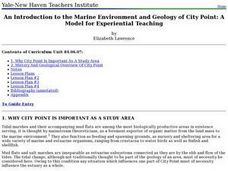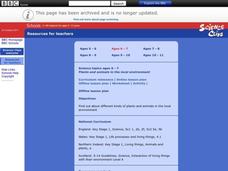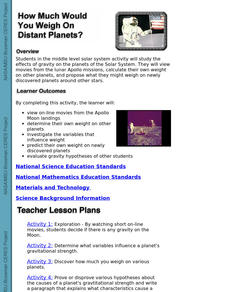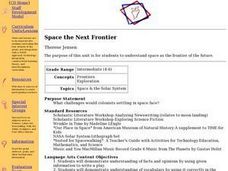Curated OER
Space Exploration
Sixth graders identify and interpret the following: What is space?, Space Race, Living in space?, Man on the Moon, Astronaut training; students compare/contrast US and Russia space exploration. Students write a letter of application to...
Curated OER
Mare Nubium and Las Vegas
In this satellite images worksheet, learners observe two photographs taken by the LRO Satellite of downtown Las Vegas and the moon. They solve 3 problems including determining the size of craters in the images, comparing the craters to...
Curated OER
Space Capsules:The Egg-stronaut Egg Drop
Students brainstorm the factors affecting the speed at which a space capsule reaches the surface of a planet or moon and suggest how engineers might deal with each factor. They then create a model which is dropped from a high point...
Curated OER
An Introduction to the Marine Environment and Geology of City Point: A Model for Experiential Teaching
Students begin the lesson by researching the history of City Point, Connecticut. Using a map, they color areas they were asked to find and discuss why the areas are important to the community. As a class, they are shown recent slides...
Curated OER
Plants And Animals in the Local Environment
Students observe the various living things they can find outside their playground making sure to look both on the ground and in the air. They develop a large poster Venn digram, as a class, of plants and animals that live in the air, on...
Curated OER
Earth/Globe (poles & equator)
First graders create his/her own paper mache earth and label the poles and equator. The land masses can be added and labeling of specific bodies of water. The paper mache earth can then be used to discuss the sun, moon, and the earth and...
Curated OER
My Spacecraft and Cassini
Young scholars discover solutions to the problems that NASA used in a previous lesson. They write a paper comparing and contrasting their spacecraft idea to the one that was actually used to go to Saturn. They also discover Saturn's...
Curated OER
Yearly Place Based theme
Students are awaken to their surroundings. They gain a greater access of how their city was formed. Students assess the human impact on the land. They comprehend the cultural diversity of the city.
Curated OER
Poetry and Nature
Learners observe an object in nature and record them. In groups, they create a group poem about the same object. They create their own poem based on another object using other their senses to help them. They share their poems with the...
Curated OER
The Impact
Students study inventions and how they have impacted us. In this investigative lesson students study the history of two inventors then pretend that they are an inventor.
Curated OER
How Much Would You Weigh On Distant Planets?
Students study the effects of gravity on the planets of the Solar System. They view movies from the lunar Apollo missions, calculate their own weight on other planets, and propose what they might weigh on newly discovered planets around...
American Museum of Natural History
What do You Know About Marine Biology
Show me what you know about the sea. Learners answer 10 questions about marine biology. The questions range from what evidence points to the origin of life to the biggest threat to oceans.
NASA
Packing for a L-o-o-o-ng Trip to Mars
Pack just enough to fit. Crews determine what personal items to take with them on a trip to Mars. Each team must decide what to take with them on a two-and-a-half year trip to Mars and whether their items will fit within the allotted...
K12 Reader
Galileo and His Telescope
Learn about Galileo Galilei's contribution to modern science with a reading passage that focuses on reading comprehension. After kids read several paragraphs about his life, they answer five questions about the information they have just...
It's About Time
Communication Through Space
If humans do find aliens, how would we communicate with them? An intriguing lesson walks through some of the challenges associated with this question. How long would a message take to reach a specific destination, what language should we...
Messenger Education
Mission: Possible—How Can We Plan an Exploration of Another World?
An astronaut's spacesuit weighs 280 pounds and takes 45 minutes to put on — that's a serious suit! The second activity of a three-part series allows pupils to see all that goes into space exploration. Through simulations, groups analyze...
Curated OER
Gravity Versus The Mighty Egg - Biology Teaching Thesis
Students are able to describe the principles of gravity. They name other places in the real world where we compensate for gravity. Students design a shock absorber with limited materials and explain how it works to protect an egg. They...
Curated OER
Oceanography Worksheet #1
If you are teaching physical oceanography to middle school earth scientists, here is a terrific multiple choice worksheet. Learners look at a diagram of a landscape created by glacial sediment deposition and the resulting ocean floor....
NASA
Oh, Chute!
Using a scare model of the a test vehicle developed by the Systems Architecture and Integration Office at NASA, groups determine the dimensions for a scale model of the parachute compartment. The groups also determine the volume of the...
DiscoverE
Touch Down
Protect the marshmallows! Groups create contraptions that will keep marshmallows in a cup, even after dropping them from a certain height. This is a fun way to model the shock-absorbing capabilities of spacecraft.
American Museum of Natural History
What is Marine Biology?
A marine environment covers the majority of the earth but is arguably the least understood. Teach young scientists about the characteristics of oceans and ocean species using an interactive online lesson. The in-person or remote learning...
Curated OER
Space the Next Frontier
Young scholars examine the use of space as the frontier of the future. Using the colonist's experience coming to the New World, they identify challenges they would face if they were to settle in space. As a class, they share what they...
Curated OER
Exploring the Hudson in 1609
While this lesson focuses on a study of the Hudson River, it could be used as a template for a discussion of map skills, converting measurements, and plotting a route. The lesson includes vocabulary and other resources to make it a...
Curated OER
The Work of Waves and Wind
This is not revolutionary, but it is informative. Earth science viewers in grades 7-12 get carried away with wave and wind erosion. They view diagrams of how waves impact ocean shorelines. They see examples of the different types of sand...
Other popular searches
- Moon Landing Worksheets
- 1969 Moon Landing
- First Moon Landing
- Moon Landing Math
- Moon Landing Science
- The Moon Landing
- Facts About Moon Landing
- Moon Landing Hoax
- Moon Landing Lab
- Moon Landing History
- Nasa Materials Moon Landing
- Faked Moon Landing

























